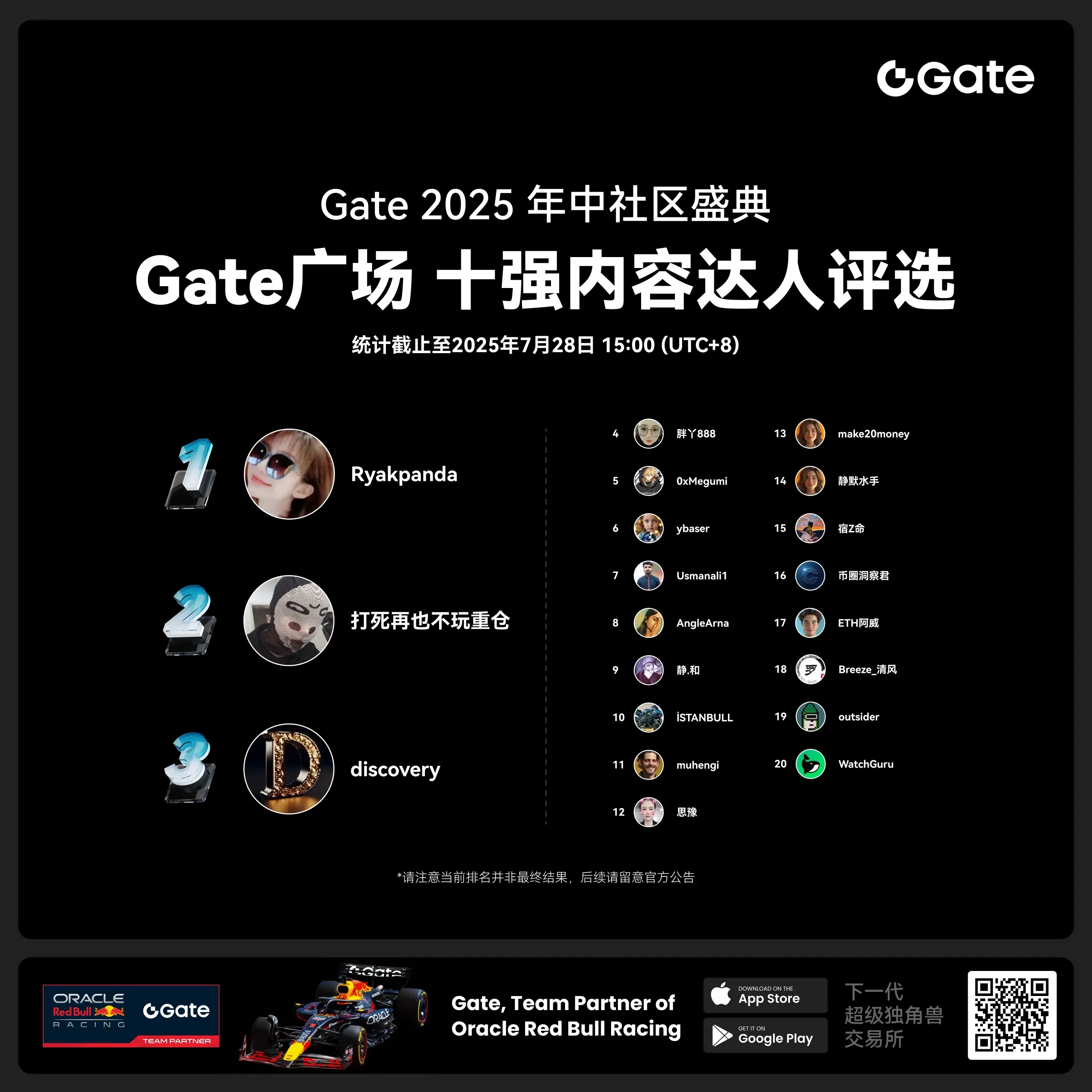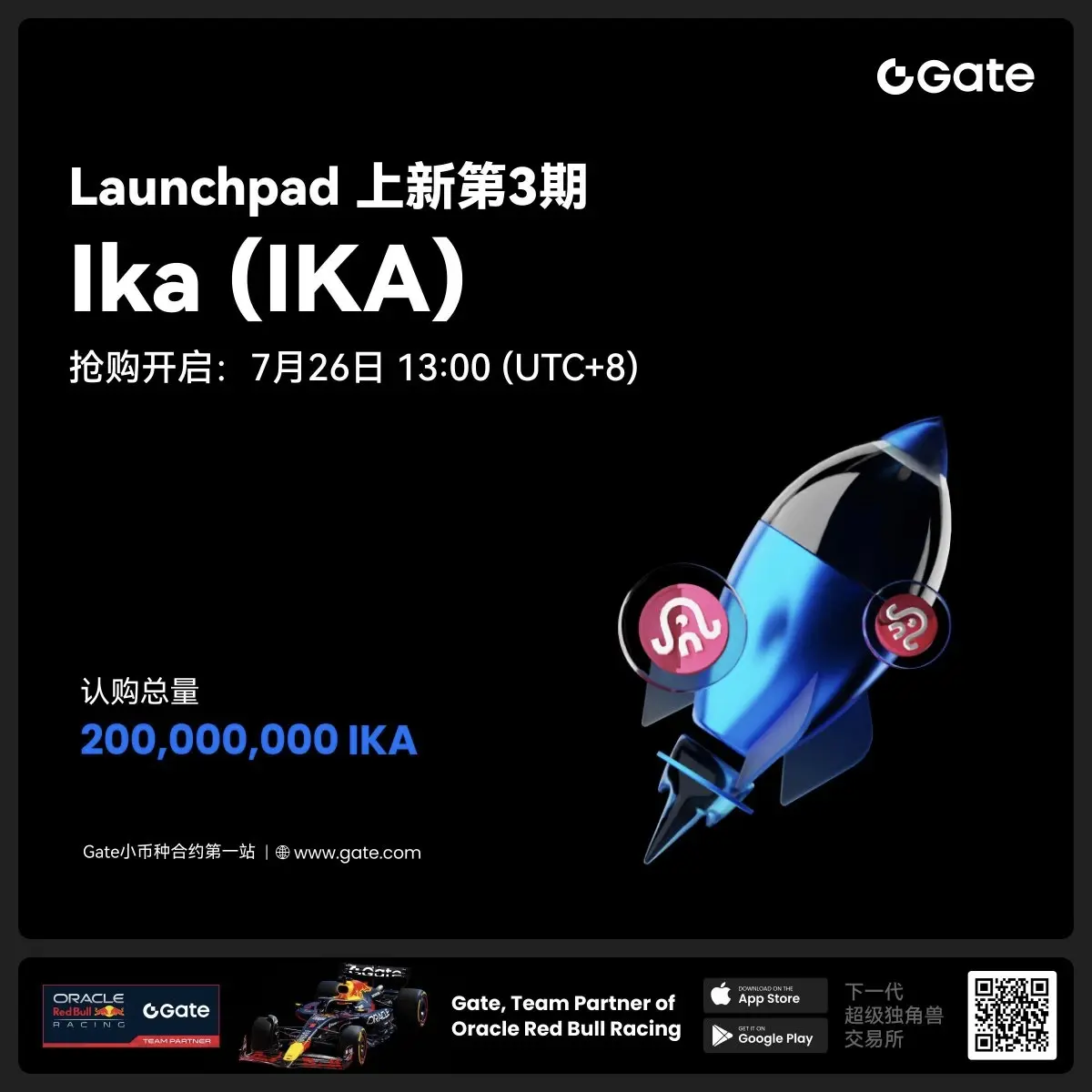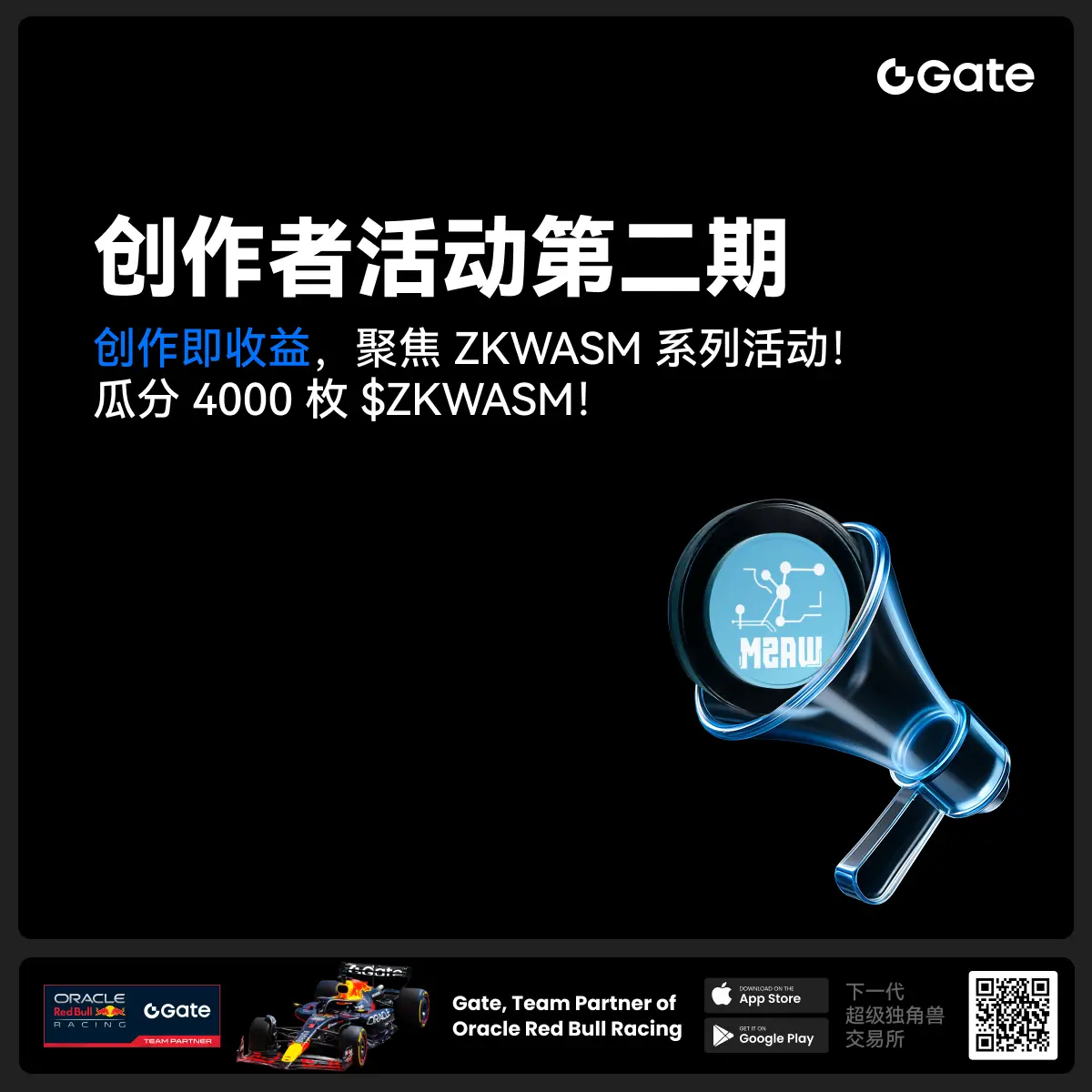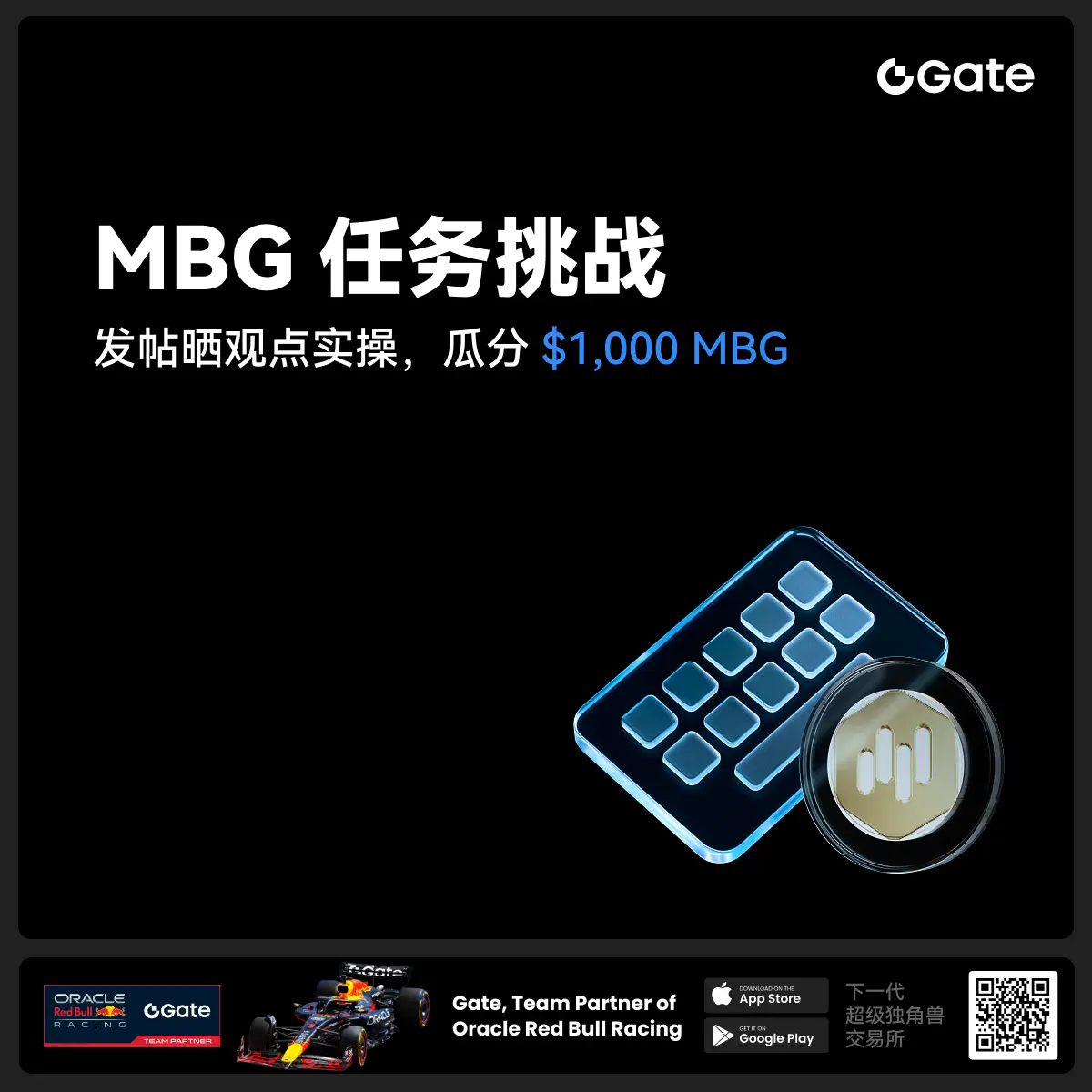- 話題1/3
49978 熱度
6890 熱度
5655 熱度
1042 熱度
658 熱度
- 置頂
- 親愛的廣場用戶們, #Gate 2025年中社区盛典# 投票中!🔥
🙌 廣場內容達人TOP40榜單新鮮出爐!速速圍觀榜單,爲你喜愛的達人瘋狂打call吧:
www.gate.com/activities/community-vote
每天完成【廣場】互動任務可獲得助力值,每投出30助力值即可參與抽獎一次!
iPhone 16 Pro Max 512G、金牛雕塑、潮流運動套裝、合約體驗券、熱門幣種等你抽!
助力越多,中獎機率越大,下一個抱走iPhone 16的錦鯉就是你!🧧
別猶豫,帶上你的“歐氣”,爲達人衝榜贏大獎!
https://www.gate.com/announcements/article/45974
- 🎉 Gate 廣場 IKA Launchpad 發帖活動來襲!🎉
Gate Launchpad 認購 IKA 最後24小時!曬出你的認購體驗,和大家一起分享,每個人都有機會瓜分 $200 獎池!
🎁 4位幸運分享者*$50合約體驗券每人!
🧐 如何參與:
1.在廣場發帖,帶上 #GateLaunchpad上线IKA# 標籤
2.曬出你的認購截圖 或 分享你的獨特認購小竅門/心得或趣事
3.保證帖子大於50字,內容有趣有料,原創,集齊至少3個互動(點讚/評論/轉發)
IKA認購連結:https://www.gate.com/launchpad/2336?downgarde=true
活動時間:7月28日 12:00 - 7月30日 24:00 (UTC+8)
趕快加入,分享你的精彩時刻,你就是下一個幸運兒!
- 📢 Gate廣場 #创作者活动第二期# 正式開啓!
聚焦 ZKWASM 系列活動,分享你的觀點,瓜分 4,000 枚 $ZKWASM!
ZKWASM 作爲 zk 公鏈先鋒,正在 Gate 平台重磅推廣!
三大活動聯動上線:Launchpool 認購、CandyDrop 空投、Alpha 專屬交易——不要錯過!
🎨 活動一:發布廣場貼文,贏內容獎勵
📅 時間:7月25日 22:00 - 7月29日 22:00(UTC+8)
📌 參與方式:
- 在 Gate 廣場發布與 ZKWASM 或其三大活動相關的原創內容(不少於 100 字)
- 添加標籤: #创作者活动第二期# #ZKWASM#
- 附本人參與 Launchpool/CandyDrop/Alpha 的截圖(如認購、空投或交易)
🏆 獎勵設置:
- 一等獎(1名):1000 枚 $ZKWASM
- 二等獎(2名):500 枚 $ZKWASM
- 三等獎(10名):100 枚 $ZKWASM
📋 評選標準:內容質量、互動量、項目相關性,附活動參與截圖者優先。
📢 活動二:發推贏傳播力獎勵
📌 參與方式:
- 在 X(推特)發布與 ZKWASM 或三大活動相關的原創內容(不少於 100 字)
- 添加標籤: #ZKWASM # GateSquare
- 填寫登記表 👉 https://www.gate.com/quest
- 📢 Gate廣場 #MBG任务挑战# 發帖贏大獎活動火熱開啓!
想要瓜分1,000枚MBG?現在就來參與,展示你的洞察與實操,成爲MBG推廣達人!
💰️ 本期將評選出20位優質發帖用戶,每人可輕鬆獲得50枚MBG!
如何參與:
1️⃣ 調研MBG項目
對MBG的基本面、社區治理、發展目標、代幣經濟模型等方面進行研究,分享你對項目的深度研究。
2️⃣ 參與並分享真實體驗
參與MBG相關活動(包括CandyDrop、Launchpool或現貨交易),並曬出你的參與截圖、收益圖或實用教程。可以是收益展示、簡明易懂的新手攻略、小竅門,也可以是現貨行情點位分析,內容詳實優先。
3️⃣ 鼓勵帶新互動
如果你的帖子吸引到他人參與活動,或者有好友評論“已參與/已交易”,將大幅提升你的獲獎概率!
MBG熱門活動(帖文需附下列活動連結):
Gate第287期Launchpool:MBG — 質押ETH、MBG即可免費瓜分112,500 MBG,每小時領取獎勵!參與攻略見公告:https://www.gate.com/announcements/article/46230
Gate CandyDrop第55期:CandyDrop x MBG — 通過首次交易、交易MBG、邀請好友註冊交易即可分187,500 MBG!參與攻略見公告:https://www.gate.com/announcements
- 📢 #Gate广场征文活动第三期# 正式啓動!
🎮 本期聚焦:Yooldo Games (ESPORTS)
✍️ 分享獨特見解 + 參與互動推廣,若同步參與 Gate 第 286 期 Launchpool、CandyDrop 或 Alpha 活動,即可獲得任意獎勵資格!
💡 內容創作 + 空投參與 = 雙重加分,大獎候選人就是你!
💰總獎池:4,464 枚 $ESPORTS
🏆 一等獎(1名):964 枚
🥈 二等獎(5名):每人 400 枚
🥉 三等獎(10名):每人 150 枚
🚀 參與方式:
在 Gate廣場發布不少於 300 字的原創文章
添加標籤: #Gate广场征文活动第三期#
每篇文章需 ≥3 個互動(點讚 / 評論 / 轉發)
發布參與 Launchpool / CandyDrop / Alpha 任一活動的截圖,作爲獲獎資格憑證
同步轉發至 X(推特)可增加獲獎概率,標籤:#GateSquare 👉 https://www.gate.com/questionnaire/6907
🎯 雙倍獎勵機會:參與第 286 期 Launchpool!
質押 BTC 或 ESPORTS,瓜分 803,571 枚 $ESPORTS,每小時發放
時間:7 月 21 日 20:00 – 7 月 25 日 20:00(UTC+8)
🧠 寫作方向建議:
Yooldo
Tezos区块链升级显著降低运行成本 为DeFi应用创造新机遇
Tezos区块链"Delphi"升级显著提升DeFi应用吸引力
Tezos区块链近期完成了名为"Delphi"的重要升级,这次升级大幅降低了网络的运行成本,为开发者部署复杂应用创造了有利条件,尤其是在去中心化金融(DeFi)领域。
升级后,Tezos网络的Gas消耗降低了约75%,存储成本也下降了4倍。这意味着开发者可以在Tezos上部署更加复杂的智能合约和应用程序,而无需担心高昂的运行成本。
一位业内专家指出,这次升级结合Tezos定期升级的特性,使得Tezos成为了一个成熟的DeFi开发环境。事实上,Gas费用的大幅下降对DeFi应用的开发至关重要。
与其他区块链类似,Tezos的Gas费反映了执行操作所需的计算复杂度。不同的是,Tezos上的Gas本身是免费的,主要用作限制应用程序过度消耗算力的机制。但用户仍需根据操作所需的Gas量支付相应费用。
通过降低Gas消耗,"Delphi"升级使得在Tezos上部署复杂的DeFi智能合约变得更加容易和经济。这次升级的核心开发团队之一的负责人强调,Gas成本的大幅下降显著提升了Tezos对DeFi应用的吸引力。
他还补充说,Tezos采用的新的、更频繁的协议升级节奏,将使其在性能提升、新技术融合和新用例开发等方面保持领先地位。
早在今年10月初,Tezos就开始在DeFi领域进行测试,被认为是主流区块链平台的有力竞争者之一。如今看来,这次升级进一步增强了Tezos在DeFi领域的竞争力。
总的来说,"Delphi"升级不仅大幅降低了Tezos的运行成本,还为该网络吸引更多DeFi应用开发者铺平了道路,有望推动Tezos生态系统的进一步发展和繁荣。